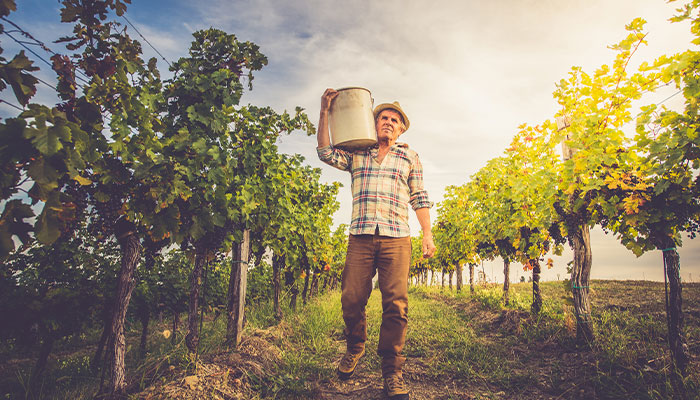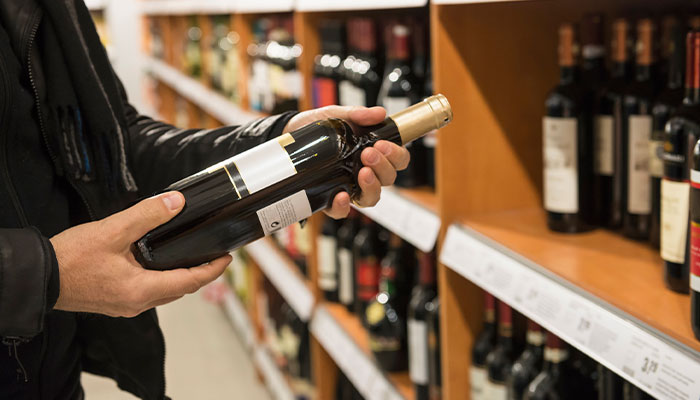Wine-loving Australians are sceptical about organic wine, with most being prepared to pay only a small or no premium to drink it, analysis of an international study reveals.

But there are ways and means to encourage Australians to drink more organic wine, says a Macquarie University researcher..
Dr Rezwanul Rana is a teetotal health economist. But when a colleague asked him to do some statistical analysis on data collected in 2019-2020 from around 2500 wine drinkers in Australia, Chile, France, Italy, the Netherlands, South Africa and the United States, he was intrigued.
Portrait of an organic wine drinker
Like organic food, organic wine is relatively expensive to produce. So, the survey’s primary focus was on how much of a premium consumers would pay for it.
“A little under half of those surveyed said they would only pay US$1-$5 more for a bottle of wine that was organic,” Dr Rana says. “If they are willing to buy it at all, most consumers in all the countries surveyed would only pay slightly more for organic wine.”
It wasn’t older wine drinkers, presumably more affluent and health conscious than their younger counterparts, who were willing to pay extra for wine grown without chemical fertilisers, pesticides, fungicides and herbicides and free from sulfur dioxide-based preservatives.
The quality of organic wines has improved dramatically, but one reason many older wine drinkers are wary of them could be bad past experiences.
“In ‘new world’ countries, such as Australia, it’s younger people, especially ones who live in urban areas, who are keenest on organic wine and they are most likely to drink it in social situations,” Dr Rana says.
“That’s presumably because they are more adventurous, more concerned with the environment and more likely to have eaten organic food. That noted, those who eat organic food didn’t show the predisposition to drinking organic wine that might be expected.
“Consumers view organic food and organic wine quite differently.”
It’s a matter of taste
The survey data found Europeans and young urbanites in the new world were the biggest organic wine drinkers. Dr Rana believes there are classificatory and historical reasons for this.

Age factor: In Australia, younger people are keenest on organic wine, the analysis shows.
“In contrast to EU countries, new world countries are strict about organic classifications,” he says. “Whether any sulfur dioxide can be used in organic wine is a subject of ongoing and passionate debate.
But in countries such as the US and Australia, either no or very little sulphur dioxide is used, while in Europe they are a little more relaxed about preservatives. So, in Europe, organic wines never tasted that much different to the non-organic wines people were used to.”
On top of tasting different, organic wine in new world countries frequently tasted unpleasant in the past.
“In the 1970s and 1980s, organic winemakers were making it up as they went along and the results were often suboptimal,” says Dr Rana.
“The quality of organic wines has improved dramatically, but one reason many older wine drinkers are wary of them could be bad past experiences.”
Can sceptical Australians be won over?
Dr Rana has four suggestions for those who would like to see Australians drink more organic wine.

Shelf life: Positioning in bottle shops and labelling wine are among strategies that might increase the popularity of organic wine.
First, get the positioning right. “Think about how organic food is positioned in supermarkets,” Dr Rana says. “Organic fruits and vegetables are prominently displayed in the fruit and vegetable section, making it easy for shoppers to notice then buy them. If you go into a bottle shop, the organic wines will often be ‘ghettoized’ in an obscure corner of the shop.”
Second, get the labelling right.
“Europeans, who grow up in cultures that have been producing wine for centuries, are confident about buying wine,” Dr Rana says.
“Australians pay much more attention to labels. They want to be reassured by the information displayed on the label that they are buying the ‘right’ wine. Organic winemakers have shot themselves in the foot with their failure to devise and universally embrace a logo that makes it clear their wine is chemical free.”
Third, get the brand associations right.
“Some of the world’s most prestigious winemakers now make organic wines and these wines have won many awards,” Dr Rana says.
“Yet many Australians believe organic wine is still the product of a hippy cottage industry. It needs to be made clear to them that the organic wine of 2022 is far superior to that of 1972.”
Fourth, go after the hipsters first.
“The most bang for marketing buck will come from targeting young, inner-city professionals,” Dr Rana says.
“These are the consumers who want to signal that they are discerning and environmentally conscious by ordering a glass of organic wine at a restaurant. Or taking a bottle of organic wine to a friend’s barbeque. You can mock hipsters as much as you like, but they are often tastemakers for the broader population.”
The Swedish example
In Sweden, the government controls the sale of alcohol. When it decided it wanted to promote the consumption of organic wine, it pursued the strategies suggested by Dr Rana.
“Long story short, the Swedish government mandated that organic wine be prominently displayed in bottle shops and invested in educating Swedes about the environmental and health benefits of organic wine.
It also told Swedes they should buy it because it had a ‘pure taste’ and because it was a way of supporting local winemakers,” says Dr Rana.
“That resulted in organic wine increasing its in a relatively short period.”
is a health economist at Macquarie University’s Centre for the Health Economy.





